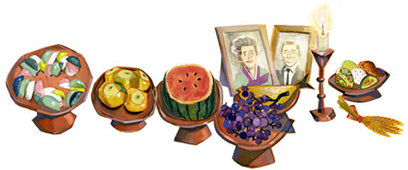A scene from tonight's taekgyeon class. We have just finished our warm-up.
관장님: Okay, um... now get on the floor.
[My two fellow trainees and I do as we are told.]
관장님: Now do eopdeuryeo palkuphyeo pyeogi1.
Me: ...?!?!?! What is that?
관장님 (in English): Do push-up!
Me: Oh, okay. How many?
관장님: One hundred.
Me: One hundred?!
Other guy: What?!
관장님: What's the problem? Be grateful it isn't two hundred.
[Seventy push-ups in, I notice that my fellow trainees have stopped.]
[Thirty push-ups later, I collapse to the floor.]
Me: Aigo2... So, uh, how many did you do?
Other guy: Oh, I just did fifty.
Me: Fifty? Come on! Well... at least pani sijak... ida3.
Other guy: What?
Me: Um... pani sijakida?
관장님: Pani... Oh! You mean sijaki panida4.
Me: Ah, that's right. Sijaki panida. Haha, I'm so stupid.
- - -
For those for whom this made very little sense, an explanation: I meant to encourage my fellow trainee with a proverb that I had recently learned in Korean class. The proverb is "시작이 반이다," which is basically equivalent to, "Starting is half the battle" (or the clever rhyming version I found online: "Well begun is half done"). He'd done fifty push-ups, and he was halfway through!
Unfortunately, I mixed up the two nouns in the expression and ended up telling him something more along the lines of, "Half is just the beginning." Even if it did make any sense, it probably wouldn't have been very encouraging at all! You've already done fifty eopdeuryeo palkphyeo blah blah whatever, but that's just the start of it... *cue evil laugh*
When it comes to using the new Korean words and expressions I've been learning in class, I inevitably make foolish mistakes. In the best case scenario, I bring a conversation with a Korean friend to an awkward halt because I sound like a stilted textbook example. In the worst case scenario, my friend decides to switch to English because they literally can't make sense of what I'm trying to say.
But in embarrassing times such as these, I remember another proverb, "Nothing ventured, nothing gained." Or the Korean version: 범의 굴에 들어가야 범을 잡는다5. You need to enter the tiger's den if you want to catch it. In my case, the tiger is fluency in a foreign language and the cave is an endless abyss of silly and awkward misunderstandings.
- - -
1 '엎드려 팔굽혀 펴기' is a ridiculously long word for 'push-up'. I mean, seriously?!
2 '아이고' is a common Korean expression of pain, discomfort, or dismay.
3 '반이 시작이다' does not mean anything in Korean.
4 '시작이 반이다' is a common Korean proverb.
5 In Chinese (for the heck of it): 不入虎穴,焉得虎子.관장님: Okay, um... now get on the floor.
[My two fellow trainees and I do as we are told.]
관장님: Now do eopdeuryeo palkuphyeo pyeogi1.
Me: ...?!?!?! What is that?
관장님 (in English): Do push-up!
Me: Oh, okay. How many?
관장님: One hundred.
Me: One hundred?!
Other guy: What?!
관장님: What's the problem? Be grateful it isn't two hundred.
[Seventy push-ups in, I notice that my fellow trainees have stopped.]
[Thirty push-ups later, I collapse to the floor.]
Me: Aigo2... So, uh, how many did you do?
Other guy: Oh, I just did fifty.
Me: Fifty? Come on! Well... at least pani sijak... ida3.
Other guy: What?
Me: Um... pani sijakida?
관장님: Pani... Oh! You mean sijaki panida4.
Me: Ah, that's right. Sijaki panida. Haha, I'm so stupid.
- - -
For those for whom this made very little sense, an explanation: I meant to encourage my fellow trainee with a proverb that I had recently learned in Korean class. The proverb is "시작이 반이다," which is basically equivalent to, "Starting is half the battle" (or the clever rhyming version I found online: "Well begun is half done"). He'd done fifty push-ups, and he was halfway through!
Unfortunately, I mixed up the two nouns in the expression and ended up telling him something more along the lines of, "Half is just the beginning." Even if it did make any sense, it probably wouldn't have been very encouraging at all! You've already done fifty eopdeuryeo palkphyeo blah blah whatever, but that's just the start of it... *cue evil laugh*
When it comes to using the new Korean words and expressions I've been learning in class, I inevitably make foolish mistakes. In the best case scenario, I bring a conversation with a Korean friend to an awkward halt because I sound like a stilted textbook example. In the worst case scenario, my friend decides to switch to English because they literally can't make sense of what I'm trying to say.
But in embarrassing times such as these, I remember another proverb, "Nothing ventured, nothing gained." Or the Korean version: 범의 굴에 들어가야 범을 잡는다5. You need to enter the tiger's den if you want to catch it. In my case, the tiger is fluency in a foreign language and the cave is an endless abyss of silly and awkward misunderstandings.
- - -
1 '엎드려 팔굽혀 펴기' is a ridiculously long word for 'push-up'. I mean, seriously?!
2 '아이고' is a common Korean expression of pain, discomfort, or dismay.
3 '반이 시작이다' does not mean anything in Korean.
4 '시작이 반이다' is a common Korean proverb.































